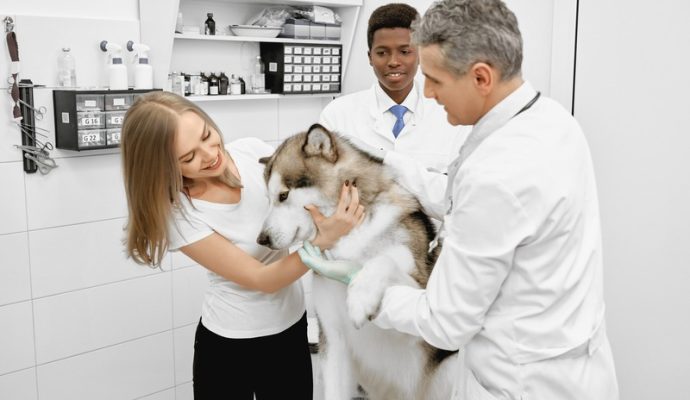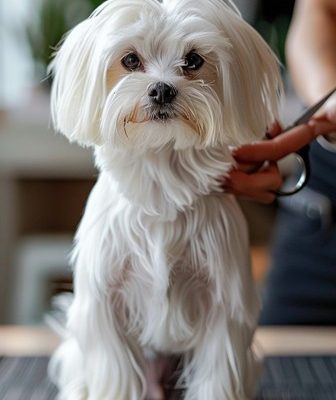Caring for our furry friends involves more than regular walks and belly rubs. Just like us, dogs need their teeth checked and cleaned to ensure their mouths stay healthy. But how often should your pooch visit the vet dentist? In this article, we’ll chew over the nitty-gritty details of dog dental care so you can keep those canine canines sparkling.
Understanding the Dental Timeline for Dogs
So, what’s the magic number? How often does your four-legged friend need to open wide for a dental check?
Puppyhood and Dental Care
It all begins when they are puppies. Vets usually recommend an initial dental evaluation as part of the puppy’s first health checks. Just as puppies receive vaccinations and deworming, they should also have their growing teeth examined. This early assessment helps vets get an idea of any potential dental issues and introduce good oral hygiene habits.
Adulthood and Preventive Dental Care
As adult dogs grow, a yearly dental check-up is crucial for early problem detection and teeth cleaning. Home care should include teeth brushing, dental chews, and water additives. Some dogs, especially smaller breeds with crowded teeth, may need more frequent dental visits due to higher risk factors. Vets can offer tailored advice based on breed and health conditions.
Senior Dogs and Dental Health
As dogs get older, they may be more prone to dental issues. It’s vital to monitor your senior dog’s dental health closely and adjust the frequency of professional check-ups accordingly. In some cases, senior dogs may require biannual visits to address age-related dental concerns.
Common Signs Your Dog May Need a Dental Check-Up Sooner
While routine check-ups are essential, certain symptoms need immediate attention. If you notice any of the following signs, it may be time for an unplanned visit to the emergency vet:
- Bad breath that’s worse than the typical doggy breath
- Visible plaque and tartar build-up
- Red, swollen, or bleeding gums
- Difficulty eating or noticeable discomfort while chewing
- Loose or missing teeth
- Pawing at the face or mouth
- Drooling more than usual, sometimes with blood
These symptoms can indicate severe dental problems that require immediate attention to prevent tooth loss and more serious health issues.
What Happens During a Dental Check-Up
A typical visit to the dog dentist includes several steps:
- Oral Examination: An initial exam to spot signs of dental disease, usually under anesthesia.
- Teeth Cleaning: Removal of tartar and plaque build-up, followed by tooth polishing.
- Preventive Measures: Application of fluoride or sealants to strengthen teeth and ward off decay.
- Treatment Recommendations: Discussion of findings and possible treatments such as extractions or antibiotics.
- Home Care Guidance: Advice on at-home dental care and the setup of the next check-up.
Your vet plays a critical role in ensuring your furry friend’s teeth are healthy and gleaming.
Enhancing Your Dog’s Dental Care at Home
In between vet visits, taking care of your dog’s teeth at home is crucial. Here’s how you can play an active role in your dog’s dental hygiene:
- Daily brushing: Brushing your dog’s teeth daily is one of the best ways to prevent plaque and tartar buildup. Use a toothbrush and toothpaste specifically designed for dogs.
- Quality diet: Feeding your dog a balanced diet helps maintain overall health, including dental health. Some dog foods are formulated to help clean teeth as they chew.
- Dental chews and toys: Chew toys and dental treats can help scrape away soft tartar and massage the gums.
- Regular inspections: Regularly check your dog’s teeth and gums for any signs of disease.
Remember, good dental hygiene can extend your dog’s life by preventing oral diseases that can affect other body systems.
When to Begin and How to Keep Going
The best time to start your dog on a dental care regimen is as soon as you bring them home. Whether they’re a puppy or an older dog, it’s never too late to start. Introduce them to teeth brushing and mouth inspections gently and gradually, using positive reinforcement. Stay consistent with dental care routines, and always be on the lookout for changes in your dog’s mouth.
If you’re ever in doubt or need personalized advice, don’t hesitate to reach out to your vet for guidance. They’re your best resource for ensuring your dog’s dental health is top-notch. Additionally, keep in mind that professional dental cleaning is a part of dog wellness exams. Schedule these with your vet to ensure your dog’s health is being monitored in all aspects.
Wrapping It Up
Taking care of our dogs’ teeth is more than a cosmetic concern; it’s a crucial part of their overall health. Regular dental check-ups, at least annually, are vital for maintaining our pups’ pearly whites and preventing larger health issues. Keep an eye out for signs of dental distress, and consult your vet if you’re concerned.
With a mix of professional dental care and a solid home hygiene routine, you can keep your doggy’s grin gleaming and their tail wagging. Remember to be proactive, be attentive, and most importantly, be ready for all the dog kisses that come with a clean and healthy mouth.




